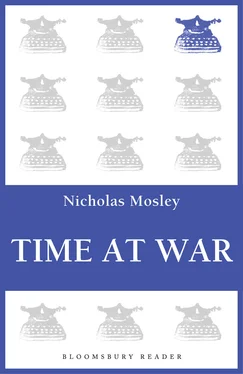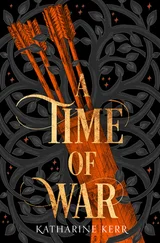I really think that the usual life of an officer is even more narrowing and binding than that of a man. In the ranks one was admittedly restricted physically by petty regulations, but as an officer one is up against the appalling tyranny of etiquette and good manners. The mess is stuffy and staid like a Victorian clubroom; and there is no escape. One cannot even roll out and wallow in a pub. One is always under the eye of a keen and critical audience.
It seems that I was beginning to realise that in describing my men as scruffy and unruly, and yet also in important ways the salt of the earth, there was indeed a tradition in which these were likely to be aspects of the same thing.
And before long we junior officers were creating our own manner of anarchic protest by turning one of our rooms (we had rooms which two of us shared in a large hut on its own) into a fantasy nightclub which we called The Juke Box. Here, away from the officers’ mess, we played records on a wind-up gramophone; we danced ballroom or exotic dances; some of us got hold of women’s clothes. There is a tradition in armies for this sort of thing on the fringes of war — presumably as a reaction or counterbalance to the brutally macho business of killing; perhaps psychologically as a form of bonding. I do not know how many of us were at that time, or remained, in fact gay: there was no evidence then of anything overtly sexual. We had nearly all come from public schools where it seemed naturally the fashion to behave in a gay style; what better could one do with no girls in sight? I myself had been no exception to this. The word ‘gay’ had not been applied to homosexuality yet, but one can see how this use of it arose. Homosexuals were seen as paragons of wit and fantasy; such qualities were life-giving in wartime. In 1942 at Ranby the emphasis was on gaiety in the old sense.
Many of the denizens of The Juke Box went on to be killed or wounded in Italy — Timmy Lloyd, one of the occupants of The Juke Box room, was shot at point-blank range when leading a patrol; Charlie Morpeth had a leg blown off in a minefield. Bunny Roger, who had been famous as a fashionable milliner before the war and was old enough not to be required to do any fighting, became renowned once more in Italy for the story that he, having become impatient with his regulation officer’s pistol, had seized a rifle from one of his men and, after a brief reminder from his corporal as to how it worked, had shot a German at an almost impossible range. Raleigh Trevelyan, my companion in the cavortings in the Peak District, was grievously wounded in the hand-to-hand fighting at Anzio. Once, when he and I were out with our platoons playing our catching-and-rescuing games, I came across him in the early morning looking pleased and I said to him, ‘Raleigh, you’re looking very starry-eyed!’ and he said ‘I’ve been seduced by my sergeant.’
I wrote to my friend Timmy, who was following my path through the army a few months behind me –
My darling platoon is now very much to my liking. They spend most of their time on training either killing chickens or stealing eggs, of which they give me a goodly portion, so I pretend very hard not to notice, though they would steal just the same if I did. And we have riotous games of football during recreational training, when it is their sole objective to trip me up and sit on me whether I have the ball or not. Which I enjoy because some of them are rather attrac.
And later –
My flesh is being torn from my bones by the icy gales which come whipping over these bloody hills.
We were sent off to a colliery in our trucks to pick up cinders to mend a road. The colliery had cinders in plenty, but also a considerable amount of unwanted coal. The first truckload of cinders was a failure, so we were told — no more cinders. Yes but plenty more coal, we bellowed, and rushed off to load up. The platoon took the coal hopefully round to their barrack room. ‘That’s a good joke!’ I said, and had them take it round to my room in the mess. Which they did in bulk, and filled the place with the filthy stuff. Later, of course, I found that it wasn’t coal at all but slate, and would by no means burn. Thus my room is filled to overflowing with rank black rock and no hope of getting rid of it. It has also irretrievably blocked the stove in its refusal to burn. So the laugh was on me; but my platoon love me all the same.
This was the gay style. I reported to my sister that to my platoon I was known as ‘Mad Mr Mosley’.
I had told my aunt that I was becoming ‘reasonably good’ at delivering lectures in spite of my stammer, but I do not remember this being so. What I have vivid memories of is my gallant platoon being hard pressed not to roll about in the aisles while I gagged and contorted, and my sergeant being driven eventually to bang on a table with his stick and shout — ‘Don’t laugh at the officer!’
In fact, perhaps my stammer was even a help to me in what is called bonding with my men, who must have dreaded the style of a gung-ho disciplinarian. The way in which a junior officer was supposed to deal with an offender was by what was called ‘putting him on a charge’. This meant that he was taken up in front of a senior officer for punishment. I found I had great reluctance to put anyone on a charge: reproof could be left to the verbal pyrotechnics of the sergeants, from whom, as I had learned when in the ranks, this sort of thing was easy to accept. It seemed to suit the men if they could see their officer in some sort of predicament equivalent to their own; then they might feel some responsibility for him as well as vice versa. This was a lesson I learned that was most valuable later in the war.
The other ranks whom the junior officers came in most personal contact with were the batmen who did the chores in the officers’ quarters; and they indeed seemed naturally to treat those who were nominally in charge of them like nannies with children. At the end of my time at Ranby, when I was away on some course before going on embarkation leave, my faithful batman Rifleman Baxter wrote to me –
Dear Sir, thank you for your interesting letter on life at Cawthorne, it sounds an awful place, but I am not at all surprised because it is Yorks, and you can expect something of that sort from the cold wind prevailing, which leaves its unsunny mark on the countenance of the inhabitants. At a place like that you really need a good old soldier to make you comfortable, as they can always find ways and means. I hope that you are more fortunate than many others in having a decent chap who would also have to be a B-scrounger considering the wartime scarcity of certain necessities.
One of the slightly more senior officers I remember with admiration and affection from Ranby was the Signals Officer Laurence Whistler, who would soon become famous for his beautiful engravings on glass. One of Laurence’s tasks was to teach us the Morse Code. He would tap out the passages from his favourite poems, and we had to unscramble these and write them down: it was a help if one had some prior knowledge of the particular piece. Laurence was also a memorable wit. Once, when we were having dinner in the mess and a more than usually unpalatable dish was placed in front of us, someone said, ‘What on earth is this?’ And Laurence said, ‘I think it’s the Piece of Cod that passeth all understanding.’
In counterpoint to both the gaiety and the drudgery of life at Ranby, I carried on an earnest correspondence on the subject of religion with both my aunt and my father. My aunt was a fervent Christian; my father was not. My argument with my aunt had come about because she had become anxious that I was spending too many weekends perhaps pursuing ‘gaiety’ in London or at the homes of my friends rather than sticking to duty and commitment. I wrote –
Читать дальше












